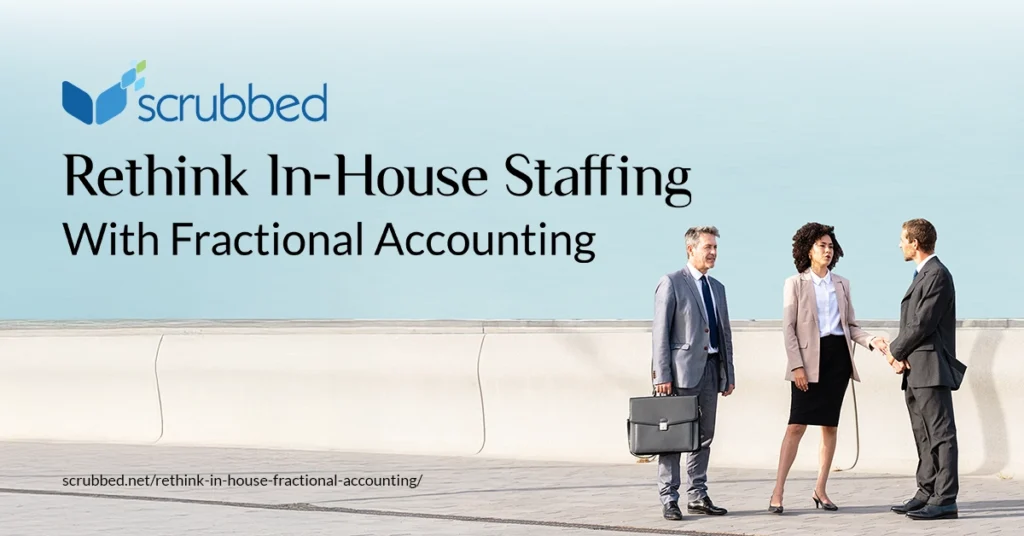As your business grows, so do your financial needs, but relying on an in-house accounting team or turning to traditional outsourcing aren’t your only options. At Scrubbed we’re encouraging CPA firms and mid-sized companies in industries like SaaS, renewable energy, real estate, and e-commerce to rethink their in-house strategy and make the switch to a fractional model especially when specialized skills like SaaS accounting expertise are needed.
Fractional accounting means hiring part-time or project-based accountants to seamlessly integrate with your team and provide critical support for day-to-day or strategic financial operations. Unlike a traditional outsourced accounting team, which focuses on completing delegated tasks, fractional accounting provides both greater flexibility and a team that can offer insight and suggestions to actively support your financial strategy.
The Hidden Costs of In-House Accounting
- High Turnover and Recruitment Costs: In-house finance teams often experience high levels of churn. About 50% of in-house teams see high turnover every year, and one in six accounting firms deals with more than 20% turnover. For CPA firms, the average annual turnover is 15%. Added to that, the direct costs associated with replacing an in-house accountant can be as much as 50-60% of the employee’s annual salary.
- Talent Shortage: With 340,000 fewer accountants in the workforce than five years ago and 75% of CPAs reaching retirement age, hiring and retention have never been more difficult. In 2024, 83% of senior leaders reported an accounting talent shortage, a dramatic increase from 70% in 2022. The talent shortage is driving up salaries ( accounting managers are currently commanding salaries of $173,000 and rising) and makes it harder for businesses to find the specialized accounting expertise they need.
- Operational Inefficiencies: In-house teams can be inefficient, thanks to limited resources and difficulty scaling quickly. The result can be delayed financial reports and other operational slowdowns. According to the Wall Street Journal, more than 600 U.S.-listed companies cited the lack of accounting professionals in-house as a reason for material weaknesses in their financial reports over a 12-month period.
The Fractional Accounting Advantage
- Stability and Retention: Fractional providers often experience lower turnover than in-house or traditional outsourcing services. For example, Scrubbed boasts a 96% retention rate, giving you a consistent, reliable accounting team that understands your business.
- Access to Top-Tier Expertise: The fractional model gives you immediate access to highly skilled finance professionals with Big 4-level experience in areas like tax strategy, compliance, financial reporting, and strategic planning. No need to hunt for the specialist talent you need in a tight market.
- Scalability: Whether you need extra support during busy times or specific advice for a significant project, a fractional team adapts in real time and can provide the resources you need with no fuss. Services like fractional CFO services make it easier to scale up quickly, giving you access to senior financial guidance exactly when and where it’s needed.
- Cost Savings: Eliminating the costs of full-time salaries, benefits, and recruitment means significantly lower overhead. Fractional teams can be far less expensive than other options because you’re only paying for expertise when you need it, not year-round.
Instead of grappling with high turnover and rising costs, switching to a fractional accounting model gives your business flexibility to innovate and grow. Here’s how:
It's Time to Embrace Fractional Accounting and Finance
How Scrubbed Can Help Transform Your Accounting Function
- From overwhelmed to optimized. Our team becomes an extension of your business, seamlessly handling everything from bookkeeping and financial reporting to CFO-level strategic support.
- From limited resources to top talent. Work with highly skilled finance professionals without the commitment of full-time hires.
- From turnover chaos to stability. With our 96 percent retention rate, you can rely on a consistent, knowledgeable team with minimal turnover.








